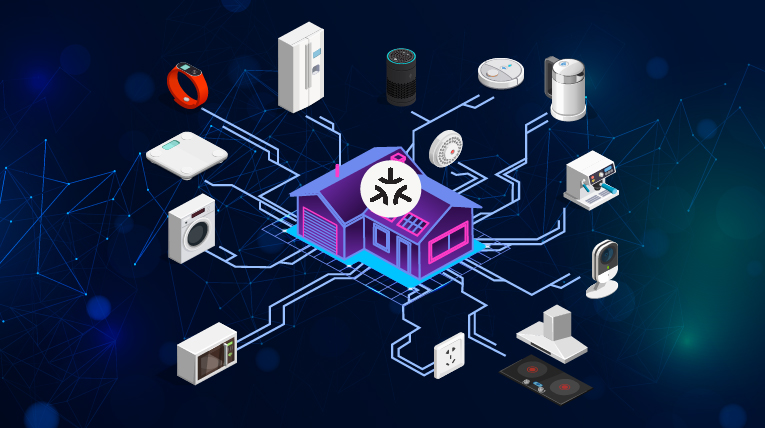Paving the Way for the Future of Smart Devices with Matter Technology
In a rapidly evolving technological landscape, smart devices have become indispensable, enhancing our daily lives with convenience and connectivity. From smart thermostats adjusting temperatures to voice-controlled assistants answering questions, these devices weave seamlessly into our routines. However, as the number of smart devices grows, so does the complexity of managing them. This is where Matter, an emerging communication technology protocol, comes into play, potentially simplifying the smart device landscape.
This blog mainly focuses on Matter technology, its benefits and applications, seamless integration and security features, and what it brings to the future of smart devices, along with insights into VVDN’s product engineering expertise in developing smart products compatible with Matter technology.
What is Matter, and How Does it Work?
Matter, formerly known as Project Connected Home over IP (Project CHIP) is a next-generation open-source, royalty-free connectivity standard specifically designed to increase connectivity among smart home products. Matter is backed by major companies including Apple, Google, Amazon, and others. The goal is to create a unified and secure standard for smart devices to communicate with each other. By ensuring compatibility across different platforms, Matter aims to simplify the smart home experience and foster innovation in the IoT space.
Incorporating the Thread wireless protocol into Matter allows for comprehensive offline computing within a local mesh network of IoT devices. This implies that even if your internet connection is lost, your devices can continue to interact with each other. The idea behind Matter is to remove the necessity for users to verify the compatibility of smart products with various devices such as Amazon Alexa, Google Homes, Samsung SmartThings, or Apple Homekit
How Does Matter Protocol Ensure the Protection of Smart Devices?
The crucial role of Matter is to safeguard IoT products and shield them from privacy breaches. By implementing robust security measures, Matter also ensures that personal data remains confidential and secure. With Matter, users can enjoy the convenience of smart devices without compromising privacy. To ensure security, the Matter protocol employs various measures, including:
- High-End Control Security: Matter uses high-end control measures to prevent unauthorized access to sensitive equipment, such as surveillance cameras, ensuring that only authorized users gain access.
- Smart Device Verification: Matter minimizes the possibility of illegal devices being integrated by ensuring that only genuine devices from reliable sources are linked to the network. This ensures a smart home free of potential risks.
- Data Protection: Matter safeguards the privacy and confidentiality of data by preventing eavesdropping on the smart home network, ensuring a safe and secure wireless connection within homes.
Advantages of Matter Technology
The Matter protocol has revolutionized the smart device industry with its numerous advantages. Here are some of the key benefits that Matter brings to the table:
- Interoperability: Matter is a new open standard that simplifies the connection of numerous smart devices from any manufacturer, allowing them to communicate seamlessly and create a unified smart home system.
- IP-Based: Matter is based on the Internet Protocol (IP), widely used for remote control and monitoring of smart devices, as well as easy integration into existing network infrastructure.
- Open Standard: The Matter standard is free and open-source. This transparency promotes innovation, reduces fragmentation in the smart device market, and allows manufacturers to adopt it without being constrained by proprietary solutions.
- Industry Support: The Connectivity Standards Alliance (CSA), which supports the Matter protocol, is composed of significant technological firms and manufacturers. The industry is pushing for its widespread adoption, as evidenced by its backing.
- Scalability: Matter is scalable and can support an extensive array of smart devices, from tiny sensors to sophisticated appliances. It can adapt to meet the evolving and changing demands of the ecosystem.
- Reliability: Matter strives to offer dependable connectivity for smart devices, minimizing issues like connectivity outages and ensuring a consistent user experience.
- Ease of Setup: Consumers can quickly configure and connect Matter-enabled products without having to deal with complicated technical setup procedures.
Disadvantages of Matter Technology
While Matter brings many benefits to smart devices, like any other platform, it also has its potential downsides. Here are some of them:
- Legacy Device Compatibility: Older smart devices that don’t support Matter may lack interoperability, compelling smart homes to continue using bridging solutions or various communication protocols.
- Security Issues: While Matter emphasizes security, the effective implementation of these security mechanisms is crucial. Insecurely set-up devices or networks may still have vulnerabilities.
- Dependency on Industry Support: Matter relies on the commitment and support of industry participants. The development and adoption of the protocol could be influenced by changes in the business environment or shifts in priorities.
- Competing Protocols: Matter competes with different communication standards and protocols in the world of smart devices and the Internet of Things. The existence of multiple standards simultaneously might lead to complications.
Diverse Industrial Applications of Matter Protocol
The Matter protocol, an open standard for smart home technology, finds applications in various industries such as:
- Smart Home Devices: Matter is primarily intended for smart home applications. It can be used for various smart home products, including smart appliances, cameras, sensors, door locks, thermostats, and lighting. By allowing different devices to effortlessly connect, Matter improves automation and enhances user comfort.
- Home Security: The Matter protocol can be used to offer integrated and secure home monitoring solutions with smart security systems, including cameras, motion sensors, doorbells, and alarms.
- Environmental Control: To increase energy efficiency and comfort in homes and buildings, Matter can be included in intelligent environmental control systems, such as heating, ventilation, and air conditioning (HVAC) systems.
- Healthcare: Matter can offer seamless networking of wearables and medical devices in healthcare applications, enabling real-time monitoring and data exchange with healthcare professionals.
- Industrial IoT: Matter’s security and interoperability features make it ideal for industrial IoT applications, including asset tracking, equipment monitoring, and predictive maintenance in logistics and manufacturing.
- Smart Retail: To improve customer experience and operational effectiveness in retail contexts, Matter may be utilized for inventory management, smart shelves, and customer interaction solutions.
- Smart Agriculture: Matter can facilitate the networking of sensors and equipment used in agriculture to monitor crop health, weather, and soil conditions, resulting in more effective farming techniques.
- Connected Cars: By easing connections between different in-car gadgets, enhancing entertainment systems, and improving vehicle-to-vehicle (V2V) and vehicle-to-infrastructure (V2I) connectivity, Matter may contribute to the automobile sector.
- Smart Cities: To enhance urban infrastructure and sustainability, Matter may be employed in applications like linked lighting, garbage management, parking systems, and environmental monitoring.
- Energy Management: By enabling energy management solutions, Matter allows users to monitor and manage power use, maximize the integration of renewable energy sources, and save energy expenditures in residences and commercial buildings.
- Hospitality: By providing smart room controls, energy management, and security systems in hotels and resorts, Matter can improve visitor experiences in the hospitality sector.
Why VVDN?
VVDN Technologies emerges as a premier partner, bringing over a decade of unparalleled expertise in product engineering, software development, and manufacturing services. As an industry leader, VVDN is committed to empowering companies striving to develop cutting-edge and seamlessly integrated smart products compatible with Matter technology.
For unparalleled Matter technology support and to embark on a journey of creating innovative and connected solutions, reach out to us at info@vvdntech.com

























